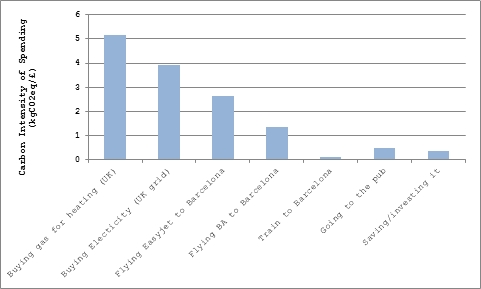Energy efficiency is often described as the “no-brainer” or “win-win” of clean energy. You use less energy, lowering carbon emissions, and save money at the same time. But looking beyond the individual act, can energy efficiency really save carbon emissions?
Say you’re a company that makes widgets, and you find a way to reduce the energy needed to make a widget. You can now make widgets cheaper since your energy bills are lower. Now, your core business is widget making, so what are you going to do with this money you’ve saved? Probably make more widgets. And so you’re not really saving any energy at all.
Now this is known as Jevons’ paradox or the rebound effect [1]. But is it true in today’s society? Will there be a market for more widgets? Or will your widgets push another company out of the market that will then close down their factory and stop using electricity to make widgets? Luckily, lots of people have looked at this and someone has gone through all the literature already, with a nice summary presentation here [2].
From the conclusions of this study, we do need to worry about the rebound effect reducing the true energy savings (and hence carbon savings) of an energy efficiency measure, but energy efficiency still is effective. For industry it’s less of a problem since energy is often not a major cost in a factory and so reducing this has minimal effect on production. For consumers, less that 30% of the energy savings are likely to be negated by a direct increase in energy use. However, looking economy wide (i.e. where else the money is spent) is more uncertain and there’s a lack of good studies, but it has been estimated that a 50% rebound effect could be possible, although there is little evidence that efficiency measures increase consumption (known as backfire).
But to simplify things a little, let’s consider the carbon emissions of an individual homeowner. Is buying energy a particularly carbon intensive use of money? And what can you do with that money that you saved from buying that shiny new LED lightbulb and still feel good about yourself?
Carbon intensity of buying UK electricity:
– Cost of electricity [3] = 0.14 £/kWh
– Carbon intensity of electricity [4] = 0.547 kgCO2eq /kWh
– Therefore: Carbon intensity of money spent on electricity = 3.9 kgCO2eq/£
So for every pound you spend on electricity in the UK, you’re producing around 4kg of carbon emissions.
The savings that provide the “win-win” of many energy efficiency measures will inevitably be spent elsewhere, so what else might you spend your money on?
So for now it really is a win-win. Buying gas and electricity are extremely carbon intensive ways to spend your money, and doing almost anything else with that money is going to reduce emissions. As the cost of electricity and gas increase, and we start to use cleaner generators in the grid and more efficient boilers in our homes, the carbon intensity of buying electricity and gas will reduce and we may find a time when we need to watch what we spend our saved pennys on if we really want to help the environment.
Also, we need to keep in mind the amount of money spent. For example, spending money on flights is a lot of money spent on a very carbon intensive activity. To save the carbon equivalent of this, you would have to cut your electricity bill by more than 10% [5].
So it seems that energy efficiency really can help in the reducing our emissions and combatting climate change. Just don’t justify that holiday to Spain on the basis that you bought a few new lightbubs.


